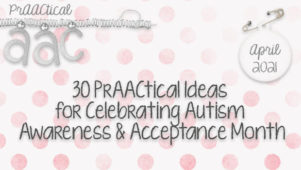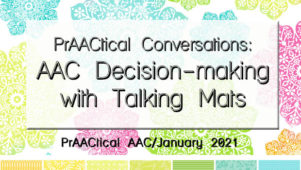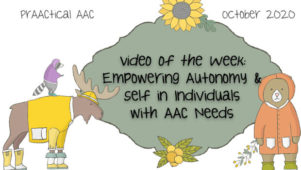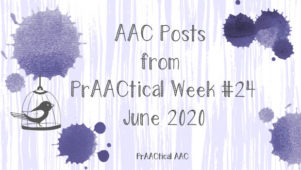30 Ideas for Celebrating Autism Awareness and Acceptance Month
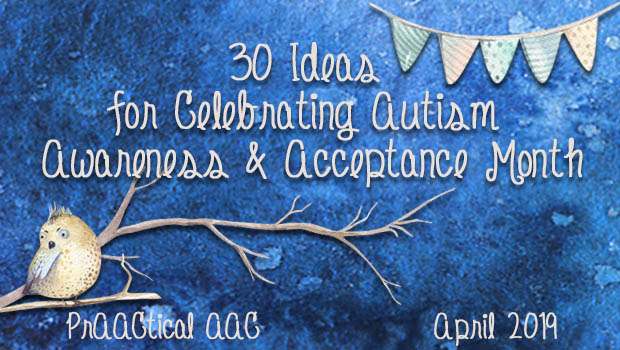
What does Autism Awareness and Acceptance Month mean to you?
From where I sit, it is a personal challenge to learn more about the lived experiences of autistic people and discover the most impactful ways to support communication learning and quality of life. Our understanding of what autism is and how we can help autistic people have a rich, fulfilling, self-directed lives is evolving. Even if you’ve worked with autistic people for a long time, chances are that there are still many more things to learn. Here are some ideas for things to do in honor of people with autism.
- Take advantage of the deep discounts offered by many AAC app developers and share this information with those who might benefit from it. AAC Specialist and SLP Lauren Enders does a wonderful service to the AAC community by tracking the app discounts in the US app store and sharing that information on social media. (Some of these companies make the discounts available throughout the world.) Thank you, Lauren, for offering to share it here as well!
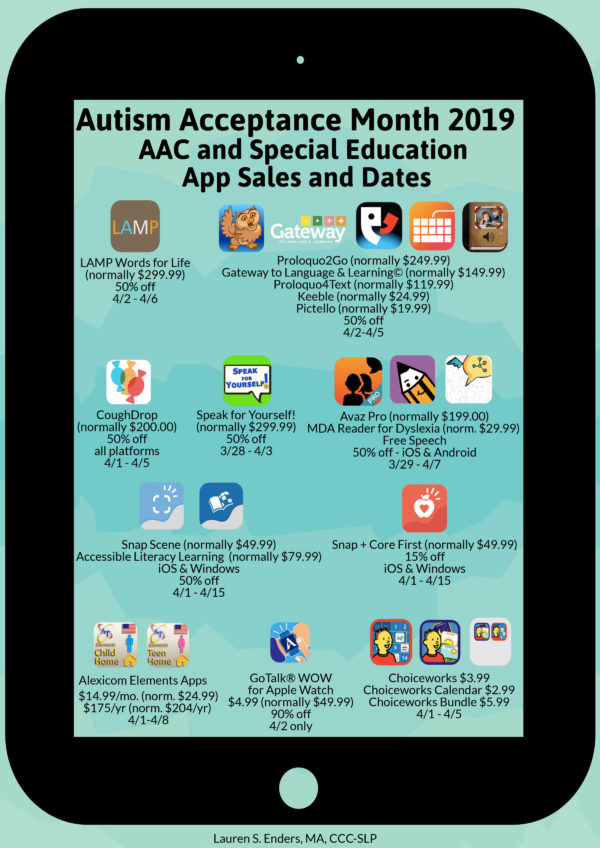
- Read autistic authors, like Alyssa Hillary Zisk, who also wrote a guest post here. You can get access to one of their recent works, AAC for Speaking Autistic Adults: Overview and Recommendations, co-authored with Elizabeth Dalton, at no charge for a limited time at this link. Difficulty gaining access? You can contact Alyssa directly at alyhillary@gmail.com (Thanks, Alyssa!).
- Learn about and from self-advocates with ASD here (scroll down for the self-advocacy section). Listen to people with autism, and, when appropriate, amplify their messages.
- Focus on safety. Help families affected by autism take preventative action with this helpful kit.
- Learn more about what makes a narrative a social story or comic book conversation as opposed to something else by reviewing the guidelines for sentence types (Click here).
- Take a ‘real look’ at a speech-language therapy session where the focus is coaching a family member to build play and interaction skills.
- Hire people with autism and/or buy their products.
- Learn more about neurodiversity.
- Introduce kids to videos featuring children with autism. Here are some suggestions to get you started.
- Share some resources in Spanish on autism support strategies from Joel Shaul.
- Consider the symbolism of images and metaphors used in conjunction with autism and drop those that do not align with your values. For example, despite their popularity, the use of ‘puzzle pieces’ is problematic for many people with autism and their families, as it depicts mystery and incompleteness.
- Strive to better understand how some people with autism experience meltdowns.
- Take action against restraint and seclusion in schools. Learn more here and here.
- Share some of the empirical supports for AAC use.
- Learn more about DSM 5 criteria for ASD.
- Many autistic people have additional challenges or disabilities. Take a ‘real look’ at a family whose child has Down Syndrome and a
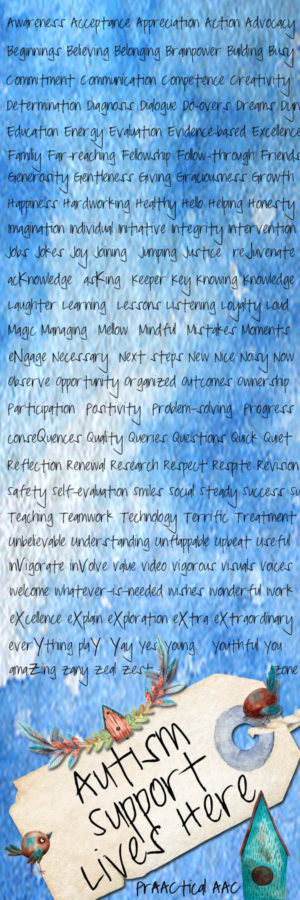 utism.
utism. - Share practical strategies with families to help them deal with the challenges that they face. Here’s an example from a family who changed some of their Christmas traditions to make it more enjoyable for their autistic child.
- Attend, create, or volunteer at an event that is sensory-friendly and accepting of people with autism. I’m excited for Sensory Sunday at Young at Art for ALL (AND super proud of the role that our team at UM-NSU CARD played in their programs and exhibits).
- Question your assumptions about autism. Articles like this one challenge us to rethink long-held assumptions about the lived experiences of autistic children and adults.
- Renew your commitment to theoretically sound and empirically supported approaches.
- Check out the Ed Wiley Autism Acceptance Library for some new reading material.
- Examine your vocabulary and consider avoiding terms like ‘low functioning,’ which are often viewed pejoratively.
- Enjoy Matthew’s communication journey with PECS, core vocabulary, and SGDs.
- Learn from some great online modules. Autism Internet Modules are excellent and free.
- Advocate for increased opportunities in supported employment.
- Learn more about ‘inspiration porn,’ how to avoid it in your own work, and how to combat it when you come across it.
- Think about supporting clients in the community.
- Think autism can’t be reliably detected before age 2? Explore some of the research by Dr. Amy Wetherby and her colleagues which suggests that children who don’t have a repertoire of 16 gestures by 16 months of age, they are at risk for ASD (click here).
- Help families prepare for summer by encouraging them to consider swimming lessons, then make some communication boards appropriate for the pool.
- Celebrate someone with autism or an agency/program that serves them well. Show your gratitude for their presence and/or the fine work they do.
Do you have favorite ways to celebrate autism each April? We’d love to hear about them.
Filed under: Featured Posts, PrAACtical Thinking
Tagged With: ASD, Autism Awareness and Acceptance Month, self-advocacy
This post was written by Carole Zangari

